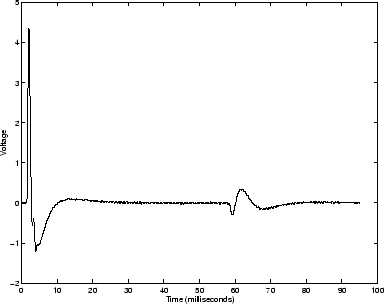Back to Kemp Acoustics Home




Next: Results
Up: Measuring longer objects
Previous: Measuring longer objects
Contents
The increase of the length of the source tube to measure longer objects is
clearly limited by the resulting larger losses in the source tube.
Since the aim is to isolate the backward going object reflections from the
waves going forward from the source, the use of multiple microphones
is a possible technique. This has been attempted by Louis et al.
[63].
Active real-time cancellation of the source reflections has also
been attempted by Sharp [64] with limited success.
Here we discuss a method of cancelling the source reflections by
post-processing [62].
We define the backward travelling calibration pulse as  .
This is shown in the first 40ms
of figure 7.3. The last 40ms of figure 7.3 shows the forward
going reflections of the calibration pulse from the source which we will refer
to as
.
This is shown in the first 40ms
of figure 7.3. The last 40ms of figure 7.3 shows the forward
going reflections of the calibration pulse from the source which we will refer
to as  .
.
Figure 7.3:
Calibration pulse including source reflections
 |
The filter  representing the source reflection function can be derived
from these signals by deconvolution:
representing the source reflection function can be derived
from these signals by deconvolution:
 |
(7.1) |
Now consider the reflections from a extended object. We define  as the
first part of the object reflections, consisting entirely of backward
travelling waves.
as the
first part of the object reflections, consisting entirely of backward
travelling waves.
 , the second part of the object reflections, however, is in general
, the second part of the object reflections, however, is in general
 where
where  is the forward travelling
reflection of
is the forward travelling
reflection of  off the loudspeaker and
off the loudspeaker and  is the remains of the
backward travelling wave. In order to reconstruct the bore we want to isolate
is the remains of the
backward travelling wave. In order to reconstruct the bore we want to isolate
 by calculating
by calculating  and subtracting:
and subtracting:
 |
(7.2) |
and
 .
.
Back to Kemp Acoustics Home




Next: Results
Up: Measuring longer objects
Previous: Measuring longer objects
Contents
Jonathan Kemp
2003-03-24
![]() .
This is shown in the first 40ms
of figure 7.3. The last 40ms of figure 7.3 shows the forward
going reflections of the calibration pulse from the source which we will refer
to as
.
This is shown in the first 40ms
of figure 7.3. The last 40ms of figure 7.3 shows the forward
going reflections of the calibration pulse from the source which we will refer
to as ![]() .
.
